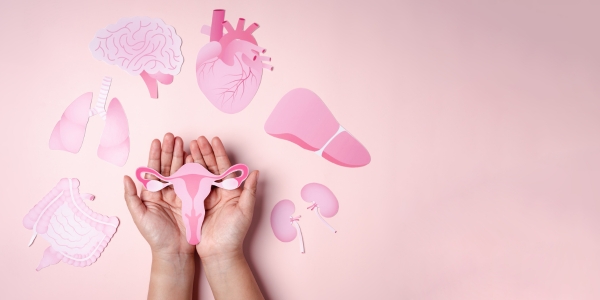Okay, let’s get real. Hormones. They’re like that one friend who’s either super chill or completely off the rails – there’s rarely an in-between. And when mine were off the rails? Forget about it. I was tired, cranky, my skin looked like a teenager’s again (and not in a good way!), and my weight was doing this weird yo-yo thing. Sound familiar?
Then I stumbled down the rabbit hole of gut health. And, whoa, mind blown. Turns out, your gut isn’t just about digesting that extra slice of pizza (though it is very good at that). It’s like the grand central station for your hormones. If your gut’s a mess, your hormones are probably throwing a full-blown tantrum.
So, why does this happen? Think of your gut as a bustling city filled with billions of tiny residents – bacteria, fungi, the whole shebang. This is your microbiome, and it’s a big deal. These little guys aren’t just hanging out; they’re actively influencing how your body makes and uses hormones. They talk to your endocrine system. Which is… well the system that makes the hormones!
When things are good in Gut City, everyone’s happy. But when the “bad” bacteria start taking over (we call this “dysbiosis” – sounds dramatic, right?), it’s like a riot in the streets. Inflammation flares up, your body struggles to absorb the good stuff (nutrients!), and suddenly, your hormones are all over the place.
My grandma used to say, “A happy gut is a happy life.” She was talking about avoiding indigestion after her famous seven-layer dip, but the principle applies! Even to, say, that estrobolome. Estro-what-now? I know, I know, it sounds complicated. Think of your estrobolome like a recycling plant inside your gut – it’s a specific group of bacteria that breaks down estrogen so your body can either reuse it or get rid of it efficiently. If that system’s out of whack, you can end up with too much or too little estrogen, which can lead to a whole host of problems.
So, how do we keep Gut City peaceful and our hormones humming along nicely? I’ve learned a few tricks – some through trial and error (let’s just say there was a very unfortunate incident with some homemade kombucha…), and some from actual, you know, science. Here are 11 hacks to get you started:
The Gut-Hormone Hacks
1. Move Your Body (But Not Like a Crazy Person)

I’m not saying you need to become a marathon runner. Seriously, I tried that once. It ended… poorly. But regular exercise, even just a brisk walk or some goofy dancing in your living room (no judgment!), does wonders for your gut. It helps things move through your digestive system (if you catch my drift), and it even boosts the diversity of your good gut bacteria. More diversity = a happier gut = happier hormones. Win-win-win! Try aiming for at least 30 minutes of moderate-intensity exercise most days of the week.
2. Eat Like a Rainbow: The Fiber & Fermentation Power Duo

This is where we combine a few key things. Load up on fruits, veggies, whole grains, and lean proteins. Think vibrant colors – deep greens, bright reds, sunny yellows. These foods are packed with fiber, which is like the VIP pass for good gut bacteria. They love fiber. The more variety, the better! They will crowd out the bad guys, and support the systems that get your hormones back on track.
And Don’t forget fermented foods! Yogurt, kefir, sauerkraut, kimchi – these guys are teeming with live bacteria (probiotics!) that can help repopulate your gut with the good guys. My personal favorite is kimchi – spicy, tangy, and so good for you. (Just maybe don’t eat a whole jar before a date… trust me.) Aim for at least 25 grams of fiber per day, and try to include at least one serving of fermented food.
3. Snack Smart (and Often!)

This one surprised me. I used to think eating less frequently was better. Nope! Turns out, smaller, more frequent meals can help keep your blood sugar levels stable. And stable blood sugar = happier hormones (especially insulin and cortisol, the stress hormone). Think of it like this: you wouldn’t let your car run on fumes, right? Same goes for your body. Aim for 3 smaller meals and 2-3 healthy snacks throughout the day.
4. Chew Your Food Like You Mean It (Seriously!)

This sounds ridiculously simple, but it makes a huge difference. Chewing properly starts the digestive process before the food even hits your stomach. It also gives your body time to register that it’s full, which can help prevent overeating (and the subsequent hormonal rollercoaster). Plus, it gives you more time to actually taste and enjoy your food! Aim for 20-30 chews per bite – it might feel weird at first, but you’ll get used to it.
5. Chill Out, Dude (or Dudette): Stress Management is Key

Stress. It’s the enemy of pretty much everything, including your gut and your hormones. When you’re stressed, your body pumps out cortisol, which can throw everything else out of whack. Find ways to manage your stress – meditate, do yoga, take a bath, scream into a pillow (sometimes that’s what it takes!). I’ve found that even just 10 minutes of deep breathing can make a world of difference. Make it a daily habit, even if it’s just for a few minutes.
6. Probiotics: Your Gut’s Reinforcements

These are the live, beneficial bacteria that you can get from supplements or fermented foods (see #2). They’re like reinforcements for your gut’s good-guy army. I take a probiotic supplement every day, and I’ve noticed a huge improvement in my digestion and overall well-being. Look for a broad-spectrum probiotic with multiple strains of bacteria.
7. Hydrate Like Your Life Depends On It (Because It Kinda Does)

Water is essential for, well, everything. It helps flush out toxins, keeps your digestive system running smoothly, and even helps transport hormones throughout your body. Dehydration can actually increase cortisol levels, so keep that water bottle handy! I aim for at least 8 glasses a day, but honestly, I usually end up drinking more. A good rule of thumb is to drink enough water so that your urine is pale yellow.
8. Booze and Caffeine: Find Your Balance (Not Total Deprivation!)

I know, I know, this one’s a bummer. But too much alcohol or caffeine can mess with your gut microbiome and your hormones. Alcohol can irritate your gut lining and make it harder to process hormones, and caffeine can spike your cortisol levels. I’m not saying you have to give them up completely (because, coffee), but try to be mindful of your intake. Maybe limit yourself to one or two alcoholic drinks per week, and try to cut off your caffeine intake after 2 p.m.
9. Get a Checkup (Don’t Be Scared!)

If you’re struggling with hormone imbalances, talk to your doctor. They can help you figure out what’s going on and recommend the best course of action. Don’t be shy! This is your health we’re talking about. They can also run tests to see if you have any underlying gut issues that might be contributing to your problems.
10. Quit Smoking (Like, Yesterday)

This one’s a no-brainer. Smoking is bad for everything, including your gut and your hormones. It messes with estrogen and testosterone levels, and just generally wreaks havoc on your body. If you smoke, quitting is one of the best things you can do for your overall health. There are tons of resources available to help you quit, so don’t be afraid to ask for help.
11. Patience, Grasshopper: It’s a Journey, Not a Sprint

This isn’t a quick fix. It takes time to heal your gut and balance your hormones. But trust me, it’s worth it. I went from feeling like a hormonal mess to feeling like, well, me again. And that’s priceless. Don’t get discouraged if you don’t see results immediately.
How Long Will This Take?
Honestly? It depends. Some people see changes in a few weeks, others take a few months. It’s like growing a garden – you have to nurture it, be patient, and give it time to flourish. Don’t get discouraged if you don’t see results immediately. Just keep at it, and you’ll get there. The important part is making these changes a lifestyle, not just a temporary “diet.”
Ready to take control of your hormones? Start with just one of these tips today. Even a small change can make a big difference. Your gut – and your whole body – will thank you! And remember, I’m here cheering you on (from my non-hormonally-imbalanced, happy-gut place!).
References
- The Gut Microbiome and the Brain
- The gut-brain axis: interactions between enteric microbiota, central and enteric nervous systems
- The Gut Microbiota and Host Health: A New Clinical Frontier
- The intestinal microbiota: a separate organ, with multiple functions
- Gut microbiota’s effect on the endocrine system
- Exercise and the Gut Microbiome: A Review of the Evidence, Potential Mechanisms, and Implications for Human Health
- Exercise Alters Gut Microbiota Composition and Function in Lean and Obese Humans
- Health benefits of dietary fiber
- Role of the gut microbiota in nutrition and health
- Fermented foods, microbiota, and mental health: ancient practice meets nutritional psychiatry
- The Effects of Probiotics and Prebiotics on the Regulation of Intestinal Estrogen Levels and Breast Cancer Risk-Review
- Gut–brain axis: interactions between enteric microbiota, central and enteric nervous systems
- Meal Frequency and Timing in Health and Disease
- Stress & the gut-brain axis: Regulation by the microbiome
- The microbiome–gut–brain axis during early life regulates the hippocampal serotonergic system in a sex-dependent manner
- Health benefits of probiotics: a review
- Fluid Balance Concepts in Humans: Homeostasis, Hypohydration, Hyperhydration, and Relationship with Health
- Impact of physical exercise on the interplay between the gut microbiome, immune system, and metabolic homeostasis: A systematic review
- Alcohol and Gut-Derived Inflammation
- Caffeine and the central nervous system: mechanisms of action, biochemical, metabolic and psychostimulant effects
- Cigarette Smoking and the Microbiome
- Impact of Smoking on Metabolism and Function of Sex Hormones, and Menopause: A Cross-Sectional Study Among Healthy Women
- The gut microbiome, the estrobolome, and the development of breast cancer: New insights and future directions
- The Gut Microbiome, Estrogen, and Estrogen-Related Cancers: A Scoping Review.







